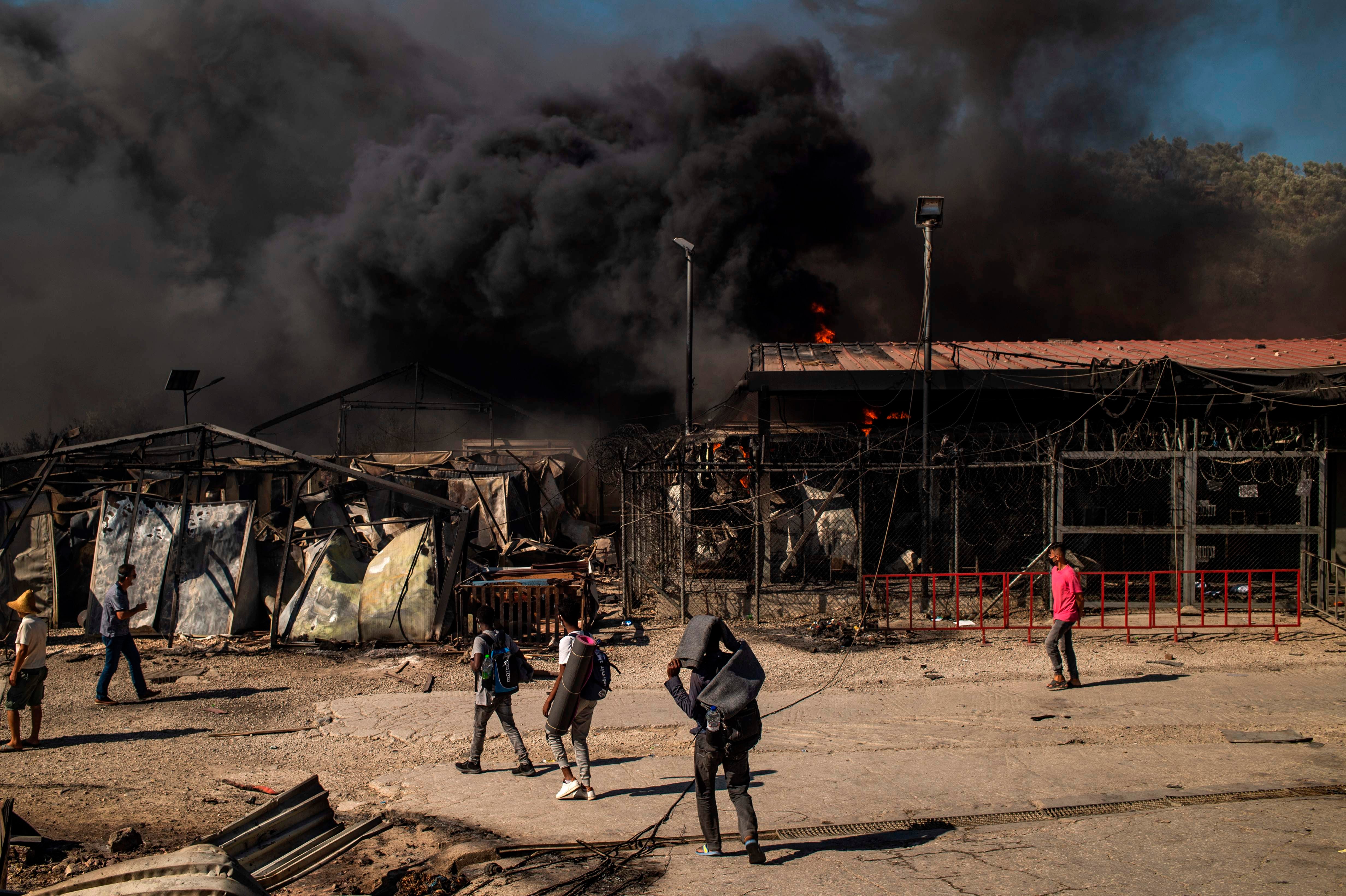‘A burning hell’: Thousands of migrants forced to flee after fire rips through Moria camp
Lockdown has made it near impossible for aid to be delivered to the migrants now forced to sleep rough, Borzou Daragahi reports


Thousands of people, including women and children already living precariously in what has been described as one of the most decrepit refugee camps in the world, were flung into further chaos after a ferocious overnight fire left the sprawling facility in ashes.
More than 12,000 migrants crammed into the notorious Moria refugee camp, Europe’s largest, on Greece’s Lesbos Island were displaced by the massive blaze that swept through early on Wednesday. Aid workers and government officials are struggling to find them shelter.
“We now have thousands of people, mostly women and children, vulnerable people, people with disabilities, sleeping rough,” said Eva Cosse, a researcher at Human Rights Watch based in Greece.
Video footage showed multiple fires throughout the camp, incinerating what appeared to be storage warehouses as well as the makeshift tents used by many of the migrants and refugees to sleep, prompting residents to make an exodus from the camp to the nearby countryside and to the UN-administered camp at Kara Tepe.
By dawn, the entirety of Moria appeared to be covered in milky ash and the air permeated with soot as the remains of the camp smouldered. Among the facilities destroyed was a Dutch-donated paediatric clinic operated by the aid group Medicins Sans Frontiers (MSF).
“Our teams saw the fire spread across Moria and rage all night long,” Marco Sandrone, of MSF, said in a statement. “The whole place was engulfed in flames. We saw an exodus of people fleeing from a burning hell with nowhere to go.”
Though officials claimed there were no injuries, aid groups said they had heard otherwise.
“Everyone who was living in the camp has now been evacuated,” Dimitra Kalogeropoulou, of the International Rescue Committee said in a statement. “Those who were living in Moria are now left with nothing; already traumatised people have now lost what few belongings they had.”
Greek officials and international aid workers announced that the 400 or so unaccompanied children at the camp would be relocated to the Greek mainland. Plans are also underway to set up tents to shelter the displaced at two disused military bases on the island, a plan that some criticised as no solution.
“Just moving the population from one crowded camp to another crowded camp doesn't solve the problem,” Spyros-Vlad Oikonomou, of the Greek Council of Refugees, told The Independent. “It’s important that this is very short term.”
It has been our position for many years that this facility was very degrading for people’s rights
Lesbos lies just 10 miles off the coast of Turkey and drew thousands of mostly Syrian migrants in 2015, creating a crisis that prompted the European Union to tighten its refugee policies to prevent those seeking asylum in the block from travelling beyond their country of arrival. Aid workers and refugee advocates say that policy is at the heart of the misery on Lesbos Island.
“We should learn that insisting on a European approach means creating a continuous downward spiral that has ultimate costs, particularly on the rights of asylum seekers and refugees,” said Mr Oikonomou. “I don’t know what else has to happen in order for Europe to realise the costs of its policy.”
Moria, designed to house 3,000 people, was grossly overcrowded; aid officials have been urging Greece to evacuate the facility and resettle its inhabitants for years.
Adding to the miseries of the camp was the first outbreak of coronavirus, prompting officials last week to implement a full lockdown of the facility and quarantine the three dozen or so residents who had tested positive. Just hours before the blaze erupted, the migration ministry said that 35 people had tested positive in the camp.
Aid workers say the camp was ideal for the spread of Covid-19. There was a lack of running water, and the sanitation system has been described as decrepit. Hundreds waited in lines with minimal social distancing for food, medical care and use of bathrooms.
According to murky accounts collected by aid agencies, the fire began as a result of a confrontation between camp inhabitants and riot police over the stringent lockdown measures. Some accused some of the camp inhabitants of setting the fires, but the origin of the disaster remained unclear.
“Whether it’s not arson or not this could have been prevented,” said Cosse. “People are told they have Covid and they are locked up in a place with 12,000 people and no measures to be treated.”
Heightened coronavirus fears have also complicated efforts to bring aid to the migrants. Efstathia Thanou, a Lesbos-based lawyer working on behalf of the migrants, said she and her colleagues have struggled to reach their clients.
“It is very worrying that there are people who are left homeless and many of them are vulnerable people,” she said. “It is definitely a situation that puts people’s lives at risk.”
Ms Thanou said smoke was still rising from the camp, with containers housing its facilities still smouldering. Though she said she and others had been urging Greek authorities to dismantle Moria, she never imagined such an apocalyptic a demise.
“It has been our position for many years that this facility was very degrading for people’s rights,” she said. “But this is not the way any us imagined it would end.”

Join our commenting forum
Join thought-provoking conversations, follow other Independent readers and see their replies
Comments